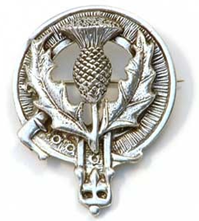|
John MacColl
(1860-1943), show above, was one of the greatest figures from
the golden age of piping. His
greatness stems from more than just his compositions. The 4th
son of Dugald MacColl, a tailor and an excellent piper from
Kentallen, he distinguished himself from his piping brothers by
a desire not just to do well, but to be the best. He would excel
not just at composing, but as a piper, a fiddler, a Highland
dancer and an athlete.
Instruction
came initially from his father, and then from the famous pipe
music editor and player Donald MacPhee (1841-1880) and finally
from Pipe-Major Ronald MacKenzie of the Black Watch (1842-1916),
who won the Prize Pipe at Inverness in 1873, the Gold Medal
there in 1875 and died in 1911. His initial forays into
competitive piping starting when he was 17 in 1877 were not
particularly successful. He was competing against piping
immortals like Robert Meldrum and John MacDougall Gillies and
success was not immediate. But in 1880 he became piper to
MacDonald of Dunach and was able to devote his life to piping.
He won the Gold Medal at Oban the next year, the Prize Pipe at
Inverness in 1883, the Former Winners’ Gold Medal at Inverness
in 1884, the Clasp at Inverness in 1900 and first prize at the
Paris Exhibition in 1902.
A professional piper, he competed
everywhere, but not just in the piping. His son John once wrote
of his father:
“He did tell me of finishing a dance,
throwing off his kilt (having running shorts underneath)
competing in the hundred yards race and then putting his kilt
and things on ready for the next dance. This, of course, was
just as a professional to augment his prize money for the day.
Naturally his major earnings came from playing the pipes,
dancing and teaching."
Unlike today, the games circuit was lucrative for one so
versatile, and the ability to earn £40 in an afternoon in the
late 1800s afforded him the leisure to pursue yachting, golf,
shinty, fiddling, Gaelic singing and composing.
He
served as pipe-major of the 3rd Battalion of the Black Watch and
after that with the Scottish Horse. He trained pipers and taught
piobaireachd for the Piobaireachd Society.
Around the turn of the century he, Willie Lawrie and G. S.
McLennan revolutionized the composition of light music, and in
particular took the competition march form to a level that has
not been equaled.
His piobaireachd playing received
mixed reactions. He won the major prizes, but never dominated
the piobaireachd lists as he could in the light music, where he
was considered the best march player of the time. Some thought
his piobaireachd playing lacked the expressive feeling of his
light music, but John MacDonald of Inverness called one of his
performances of “I Got a Kiss of the King’s Hand” at Birnam
Games “one of the most harmonious performances I have ever
listened to.” He composed three piobaireachd, two of which (Lament
for Donald MacPhee and N.M. MacDonald’s Lament)
won composing contests, and the third of which has been lost.
In
1908 he gave up the games circuit and joined the Glasgow firm of
R. G. Lawrie as the manager of their new bagpipe making branch.
John MacDougall Gillies was similarly in charge of Henderson’s
shop, and as a result, some of the greatest sets of pipes ever
made came from these two firms during this time. MacColl retired
from Lawrie’s in 1936. During those first few decades of the
1900s, he and MacDougall Gillies – who died in 1925 – helped
build the Glasgow piping community into a centre of piping
excellence that has continued to this day.
John MacColl died on June 8, 1943.
John MacDonald of the Glasgow Police played Lament for the
Children at his funeral. |



